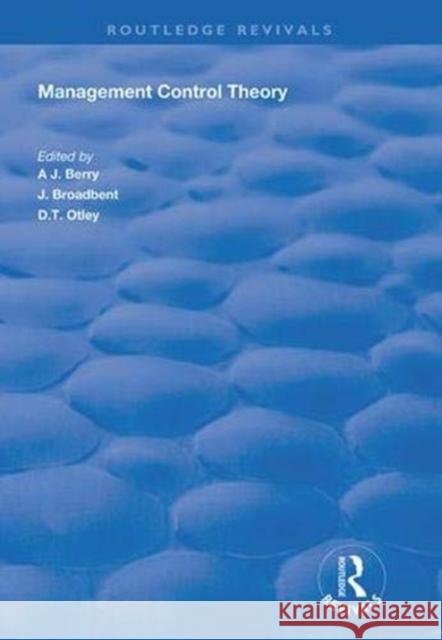Management Control Theory » książka



Management Control Theory
ISBN-13: 9781138391734 / Angielski / Miękka / 2020 / 497 str.
Management Control Theory
ISBN-13: 9781138391734 / Angielski / Miękka / 2020 / 497 str.
(netto: 245,66 VAT: 5%)
Najniższa cena z 30 dni: 236,70
ok. 16-18 dni roboczych.
Darmowa dostawa!
First published in 1998, this volume of readings provides an overview of the development of the study of Management Control theory over the past 35 years.
Part I. Introduction. 1. Giovanni B. Giglioni and Arthur G. Bedeian (1974), ‘A Conspectus of Management Control Theory: 1900-1972’, Academy of Management Journal, 17, pp. 292-305. Part II. Control as Goal-Directed and Integrative. 2. Robert N. Anthony and John Dearden (1980), ‘The Nature of Management Control’, in Management Control System, Homewood: Illinois, Richard D. Irwin, Inc., pp.3-20. 3. Tony Lowe and Tony Puxty (91989), ‘The Problems of a Paradigm: A Critique of the Prevailing Orthodoxy in Management Control’, in Wai Fong Chua, Tony Lowe and Tony Puxty (eds), Critical Perspectives in Management Control, Basingstoke: The Macmillan Press Ltd, pp. 9-26. 4. Sir Geoffrey Vickers (1958), ‘Positive and Negative Controls in Business’, Journal of Industrial Economics, 6, pp. 173-79. 5. E.A. Lowe (1971), ‘On the Idea of a Management Control System: Integrating Accounting and Management Control’, Journal of Management Studies, 8, pp. 1-12. 6. Adrian Buckley and Eugene McKenna (1972), ‘Budgetary Control and Business Behaviour’, Accounting and Business Research, 3, pp. 137-50. 7. A.E. Mills (1970), ‘Management Control and Integration at the Conceptual Level’, Journal of Management Studies, 7, pp. 364-75. 8. D.T. Otley and A.J. Berry (1980), ‘Control, Organisation and Accounting’, Accounting, Organizations and Society, 5, pp. 231-44. 9. Rick Antle and Joel S. Demski (1988), ‘The Controllability Principle in Responsibility Accounting’, The Accounting Review, LXIII, pp. 700-18. Part III. Control as Adaption. 10. Stafford Beer (1972), ‘Autonomics – Systems One, Two, Three’, in Brain of the Firm, Chichester: John Wiley & Sons, pp. 167-80. 11. Peter B. Checkland and Michael G. Haynes (1994), ‘Varieties of Systems Thinking: The Case of Soft Systems Methodology’, System Dynamics Review, 10, pp. 189-97. 12. Michael Goold and Andrew Campbell (1987), ‘Managing Diversity: Strategy and Control in Diversified British Companies’, Long Range Planning, 20, pp. 42-52. 13. Robert Simons (1990), ‘The Role of Management Control Systems in Creating Competitive Advantage: New Perspectives’, Accounting, Organizations and Society, 15, pp. 127-43, and Barbara Gray (1990), ‘The Enactment of Management Control Systems: A Critique of Simons’, Accounting, Organizations and Society, 15, pp. 145-48. Part IV. The Social Structure of Control in Organizations. 14. Selwyn Becker and David Green, Jr. (1962), ‘Budgeting and Employee Behavior’, Journal of Business, 35, pp. 392-402. 15. Michael Schiff and Arie Y. Lewin (1970), ‘The Impact of People on Budgets’, The Accounting Review, 45, pp. 259-68. 16. Peter F. Drucker (1964), ‘Controls, Control and Management’, in Charles P. Bonini, Robert K. Jaedicke and Harvey M. Wagner (eds), Management Controls: New Directions in Basic Research, New York: McGraw-Hill Inc., pp. 286-96. 17. Geert Hofstede (1987), ‘The Poverty of Management Control Philosophy’, Academy of Management Review, 3, pp. 450-61. 18. John L.J. Machin (1979), ‘A Contingent Methodology for Management Control’, Journal of Management Studies, XVI, pp. 1-29. 19. Toshiro Hiromoto (1991), ‘Restoring the Relevance of Management Accounting’, Journal of Management Accounting Research, 3, pp. 1-15. 20. N.B. Macintosh and R.L. Daft (1987), ‘Management Control Systems and Departmental Interdependencies: An Empirical Study’, Accounting, Organizations and Society, 12, pp. 49-61. Part V. The Organization in its Environment. 21. David T. Otley (1980), ‘The Contingency Theory of Management Accounting: Achievement and Prognosis’, Accounting, Organizations and Society, 5, pp. 413-28. 22. Vijay Govindarajan (1986), ‘Impact of Participation in the Budgetary Process on Managerial Attitudes and Performance: Universalistic and Contingency Perspectives’, Decision Sciences, 17, pp. 496-516. 23. William G. Ouchi (1980), ‘Markets, Bureaucracies, and Clans’, Administrative Science Quarterly, 25, pp. 129-41. 24. Anthony G. Hopwood (1990), ‘Accounting and Organisation Change’, Accounting, Auditing and Accountability Journal, 3, pp. 7-17. 25. Charles Perrow (1961), ‘The Analysis of Goals in Complex Organizations’, American Sociological Review, 26, pp. 854-66. 26. J.D. Dermer and R.G. Lucas (1986), ‘The Illusion of Managerial Control’, Accounting, Organizations and Society, 11, pp. 471-82. 27. Nils Brunsson (1982), ‘The Irrationality of Action and Action Rationality: Decisions, Ideologies and Organizational Actions’, Journal of Management Studies, 19, pp. 29-44. 28. Peter Miller and Ted O’Leary (1987), ‘Accounting and the Construction of the Governable Person’, Accounting, Organizations and Society, 12, pp. 235-65. 29. Shahid L. Ansari and Jan Bell (1991), ‘Symbolism, Collectivism and Rationality in Organisational Control’, Accounting, Auditing and Accountability Journal, 4, pp. 4-27. Part VI. Epilogue. 30. Kenneth A. Merchant and Robert Simons (1986), ‘Research and Control in Complex Organizations: An Overview’, Journal of Accounting Literature, 5, pp. 183-203.
A.J. Berry, J. Broadbent, D.T. Otley
1997-2026 DolnySlask.com Agencja Internetowa
KrainaKsiazek.PL - Księgarnia Internetowa









